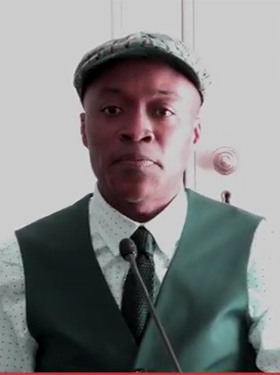On Tuesday, April 18, Dr. Stephen John Quaye, in the sixth installment of the College of Education Dean’s Distinguished Lecture Series, boldly proclaimed that #BlackLivesMatter. His poetry he recited about that subject and his unabashed declaration to racial justice established the direction for the remainder of the lecture.
Dr. Quaye is an Associate Professor in the Student Affairs in Higher Education Program at Miami University (Ohio). His research and teaching focus on how to enable undergraduate and graduate students to engage in complicated matters such as privilege, power, and oppression, as well as how storytelling is used as an educational tool to foster reflection and learning across differences.
In his lecture titled, “Scholar Activism and Self-Care in an Era of #BlackLivesMatter,” Dr. Quaye reflected on his journey as a cisgender, black African scholar-activist. To help understand his journey and research progression as a black scholar-activist, he explored new ideas through a variety of intersections as a way to understand race, power, and oppression. In 2014, Dr. Quaye’s livelihood and research were intimately shaped by the murder of Michael Brown (18), a young black man, by Darren Wilson (28), a white police officer, in Ferguson, Missouri. Dr. Quaye’s anger and pain were aggravated after witnessing his mostly white Miami University campus continue with their lives as usual. Puzzled by this realization, Dr. Quaye reflexively asked: “How is it possible that Michel Brown impacted me so greatly, and yet, it seems so many people around me were moving through life unaffected?”
Michael Brown’s death catapulted a group of scholars, students, and staff, including Dr. Quaye, to create the Mobilizing Anger Collective (MAC), an organization that addresses injustices in campuses and surrounding communities. A recent publication titled, “Blending Scholar and Activist Identities: Establishing the Need for Scholar Activism,” emerged out of MAC work. Dr. Quaye embraced his newly found activism and integrated it with his scholarship. Within his presentation, Dr. Quaye illustrated three concepts (shame, guilt, and fictive kinship) and how they relate to scholar activism.
Dr. Quaye utilizes these three concepts to have deep conversations about race, power, and oppression and to enable dialogue around diversity and inclusion. Guilt focuses on the behavior one believes to be problematic. According to Dr. Quaye, guilt is a positive feeling since it comes with the desire to resolve an issue. On the other hand, shame focuses on the whole person as negative. Shame is an internalized feeling that makes one feel smaller. Fictive kinship is a feeling of connection, family ties, or kinship with people to whom one is unrelated. As an example, Dr. Quaye explained fictive kinship as the feeling black people felt when Barack Obama was elected president. On the flip side, fictive kinship can also be a negative collective feeling. Recognizing these differences early around difficult subjects can be critical to the success of the conversation.
Dr. Quaye also believes that self-care must accompany scholar activism. Scholar activism is exhausting and demanding. Thus a healing process is required. To process his thoughts and emotions, Dr. Quaye exercises daily and sees a counselor. His new research is directed towards black student affairs practitioners and the strategies they use to deal with Racial Battle Fatigue, a condition caused by the continuous exposure to racism. While his process of healing and self-care is not exhaustive, Dr. Quaye encourages individuals to develop strategies that work for them and their communities.
If you were not able to attend the event, I encourage you to watch Dr. Quaye’s lecture and invite you to our next lecture. The College of Education Dean's Diversity Lecture Series is sponsored by the Office of the Provost and Office of Community College Research and Leadership.
• May 3 - Linda Tillman, University of North Carolina
Mentoring of Early Career and Faculty of Color and Culturally Appropriate Research Approaches
- 12:00 p.m. campus lecture, Illini Union, Room 210
- 3:00 p.m. fireside chat, Education Building
Additional Resources:
